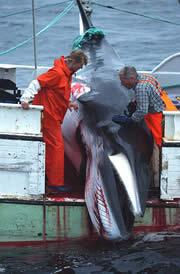Is this a big change in Icelandic policy?
 Iceland has had a scientific whaling programme for years.AP
Iceland has had a scientific whaling programme for years.APIceland has had an on-again off-again relationship with the International Whaling Commission (IWC), which instigated a moratorium against commercial whaling from 1986. Iceland took about 60 animals per year under a scientific permit from 1986 to 1989, then left the IWC in 1992 after failing to get permission for a sustainable commercial hunt. They cautiously rejoined in 2002, and have been taking a scientific catch of some 25-40 minke whales a year.
As of last week, they have announced the resumption of a commercial hunt of 30 minke and 9 fin whales in the season ending August 2007. Whalers caught their first fin whale over the weekend.
"It's not surprising," says Gisli Vikingsson, head of whale research at Iceland's Marine Research Institute in Reykjavik. "The whaling issue has always been under discussion here in Iceland. The people are very much dependent upon the fisheries."
Isn't the fin whale considered endangered?
Yes. But the 'endangered' moniker is for the global population of fin whales: an estimated 90% decline in numbers over three generations earns this tag. This is mainly attributable to huge exploitation in Antarctic waters, Vikingsson notes — catches were more than 10,000 per year at the peak between 1940 and 1960. "This was one of the worst cases of natural over-exploitation in the history of mankind," he says.
There are estimated to be 25,000 fin whales in the North Atlantic, which is thought to be more than 70% of the pre-exploitation level, says Vikingsson. "You can't say that there is a danger of extinction," he says — not in the North Atlantic.
The minke whale is classified as 'near threatened'. Vikingsson says the Icelandic population is thought to be at 90% pre-exploitation levels.
So will the catch be sustainable?
"There's no question that it is sustainable," says Vikingsson. "The main criticism is in hunting an endangered species. But I haven't heard anyone directly say this is unsustainable." The Marine Research Institute, which has been monitoring whale numbers since 1987, this year advised that the local populations could withstand an annual hunt of 150 fin whales and 400 minke whales.
Some conservation groups say that whale populations are still poorly understood, and are against commercial whaling on principle. "These whales are more valuable alive for the whale-watching industry," notes Sarah Duthie, senior oceans campaigner for Greenpeace UK, London.
Does anyone hunt these whales already?
Norway is the only other nation that allows commercial whaling, taking some 600 minke per year. Inuit hunters from Greenland and Canada also take a small number (including fin whales), and Japan and Iceland have controversial scientific hunts.
What will Iceland do with the commercially hunted whales?
Sell the meat. Observers note that only a small fraction of the meat caught in Iceland's IWC-sanctioned scientific hunt is sold domestically, so perhaps the whalers will rely on exports for cash. Iceland would need special permission to export fin-whale meat, as that would constitute trade in endangered animals.
What will happen next?
Iceland's decision could put pressure on the IWC to overturn its moratorium and put some quotas in place for commercial whaling. Vikingsson says the IWC will reconsider the fin-whale population at its next meeting, in spring 2007.
ADVERTISEMENT
But there are strong anti-whaling parties in the IWC, such as Australia and the United Kingdom. "The British government has come out and said that irrespective of the science of stock status they would be against whaling," says Vikingsson.
Several organizations, such as the UK Whale and Dolphin Conservation Society, are offering the public ways to lodge a protest with Icelandic officials.
Visit our resumescommerical_wha.html">newsblog to read and post comments about this story.
